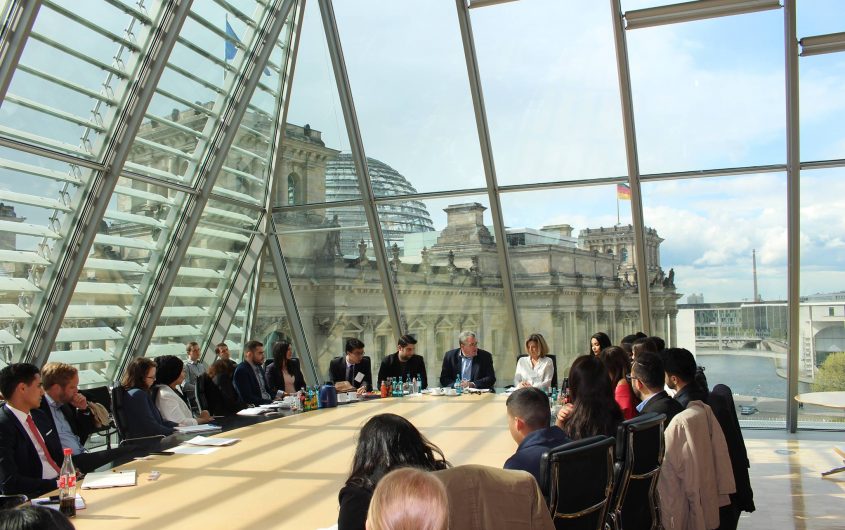
AICGS
Germany 2030: Scenarios for Germany’s Leadership Role

Stephen F. Szabo
Senior Fellow
Dr. Stephen F. Szabo is a Senior Fellow at AICGS, where he focuses on German foreign and security policies and the new German role in Europe and beyond. Until 2017, he was the Executive Director of the Transatlantic Academy, a Washington, DC, based forum for research and dialogue between scholars, policy experts, and authors from both sides of the Atlantic. Prior to joining the German Marshall Fund in 2007, Dr. Szabo was Interim Dean and Associate Dean for Academic Affairs and taught European Studies at The Paul H. Nitze School of Advanced International Studies, Johns Hopkins University. He served as Professor of National Security Affairs at the National War College, National Defense University (1982-1990). He received his PhD in Political Science from Georgetown University and has been a fellow with the Alexander von Humboldt Stiftung, the Woodrow Wilson International Center for Scholars, and the American Academy in Berlin, as well as serving as Research Director at AICGS. In addition to SAIS, he has taught at the Hertie School of Governance, Georgetown University, George Washington University, and the University of Virginia. He has published widely on European and German politics and foreign policies, including. The Successor Generation: International Perspectives of Postwar Europeans, The Diplomacy of German Unification, Parting Ways: The Crisis in the German-American Relationship, and Germany, Russia and the Rise of Geo-Economics.
Key Certainties and Uncertainties Shaping Germany’s Future Role
Both teams identified certainties:
- Germany will remain Europe’s largest economy and an open democratic polity.
- Germany will have an aging population.
- Germany will continue to have important deficiencies in its defense capabilities, even if it begins to address them today.
- The United States will continue to retreat into a more domestically-oriented role and its diplomatic retreat from Europe will continue.
- Germany will remain an export-oriented economy with a balance of payments surplus.
And uncertainties:
- The degree to which the German economy will move beyond its heavily manufacturing base toward a more service-oriented economy with a strong digital profile.
- The extent Germany can contain populist parties like the AfD and limit its move toward the right on refugee and related issues.
- Germany’s ability to deal with the China challenge to its economy.
- Germany’s role in developing a European defense in the wake of America’s retreat.
- How Germany balances its economic and security interests with a revisionist Russia.
- Germany’s eurozone policies.
- The preferences of the next generation of German leaders.
Germany as the Shaping Power of Europe
The positive scenario found a Germany in 2030 which had assumed its responsibilities in defense, upgraded its military capabilities, and worked with France on a European Defense Union. It was a Germany that seized the “Macron Moment” and revitalized the EU through the Franco-German partnership. It recognized that even after the Trump era and with a future Democratic president, the United States would be retrenching and focusing more on its domestic development—what President Obama had called nation building at home. Now living in a fully multipolar world, in dealing with Russia, Germany and Europe have to balance economic engagement with a resilient defense, including against all aspects of hybrid warfare. Germany has diversified its economy away from a heavily industrial base to a more service-oriented one that took full advantage of Brexit and the shift of finance, people, and services to Germany. It is a Germany that has turned the refugee crisis to its advantage and integrated the newcomers into its economy, thus solving its demographic dilemma. Given the large and continuing role of China, Germany had created a productive economic relationship with the world’s largest economy with the result that the EU and China have developed a rule-based system for goods and capital while ensuring that Chinese policies would not divide and conquer the EU.
Leadership: Nein Danke
The darker, “Leadership: Nein Danke,” scenario described a Germany in 2030 that had retreated and had refused to take on a leadership role. This was a Germany and a Europe that had fallen to populist parties and arguments and a post-Brexit Europe that had turned against any attempts by Paris and Berlin to lead. The German current accounts surplus has made things worse in the Eurozone and prevented any serious investment in defense capabilities. It is a Germany that cannot sustain a coherent approach to Russia and whose commercial interests, including in the important energy sector, undermined its leadership in Europe on Russia. Both the U.S. and Russia have moved substantially to the right and the U.S. no longer keeps its NATO commitment. China is able to divide and conquer the EU and Germany cannot defend itself against Chinese takeovers of German companies. China’s 16 + 1 and One Belt policies divide Europe between east and west and undermines the EU. This Germany has not dealt with the demographic stagnation and its aging population continues to be very risk-averse, resulting in economic stagnation.
The Merkel Visit and Current Concerns about German Leadership
The recent visit of Chancellor Merkel to Washington underlined these concerns about the future of German leadership. Commentaries by Wolfgang Münchau and Philip Stephens have both pointed to the challenges and deficiencies of Germany’s current role. Münchau has argued that Germany’s fiscal priorities are for a current account surplus and an underfunded defense and the two are related. Both are points of contention with the U.S. He concludes that “The surplus is strategic stupidity,” as Germany and the EU are now confronted with “a President who will not put up with these beggar thy neighbor policies.” Stephens has labeled this a Germany First approach that reflects a parochialism and lack of any sense of providing public goods, which is the essence of leadership.
As both Münchau and Stephens point out, this is the time for Merkel, in her last term as chancellor and riding on a budget surplus and strong economy, to provide the type of visionary leadership Helmut Schmidt had disparaged when he famously stated that if you want vision, see an eye doctor. But Münchau also makes the key point that the current German coalition will not allow Merkel to do what needs to be done on defense and on reducing the current account surplus. As Stephens point out, there is also a large dose of sanctimony and parochialism in the German mood, not surprising in a country which asks, “Crisis, what crisis?” All this awaits a new generation of German leaders.









